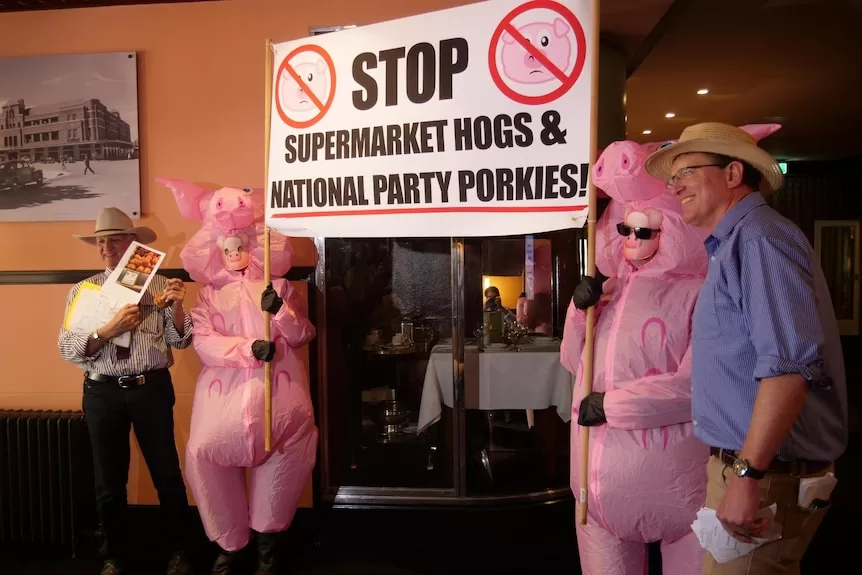- In short: Farmers and farmer groups are appearing before a Senate Select Committee inquiry into supermarket pricing and market power
- Independent MP Bob Katter and Nationals Senator Ross Cadell had a fiery exchange outside the public hearing
- What’s next? Another public hearing will be held in Melbourne, on Wednesday
An aggressive stoush has broken out between a Nationals senator and MP Bob Katter outside a senate inquiry investigating the major supermarkets.
An altercation erupted between Mr Katter and Senator Ross Cadell on the sidelines of the inquiry at Orange in the NSW Central West while the Queensland MP and Independent MP Andrew Gee were announcing a parliamentary bill into the retailers’ power.
Bob Katter told Senator Cadell, who is on the senate committee running the inquiry, to stop interrupting his media conference.
“Why don’t you spend a little bit of time attacking Woolworths and Coles instead of playing politics?” Mr Katter told him.
“Not you, Bob. I’ve got no problem with you, Bob. I’ve got a problem with the stunt man here,” Senator Cadell said, pointing to Mr Gee.
“Don’t keep interrupting me! You hear me? Don’t keep interrupting me!” Mr Katter yelled.
“Every time I’ve opened my mouth, you’ve started talking; now shut up and let me have a go.”
The argument broke out during a break at a public hearing of a Senate inquiry into supermarket prices looking into the price-setting practices and market power of major supermarkets.
The inquiry previously visited Hobart and is due to hear evidence in Melbourne tomorrow.
It heard from a former orchardist from Orange, James McClymont, who bulldozed his 22,000 trees in 2019 because growing them became financially unviable.
He told the ABC it was devastating to rip up four generations of his family’s efforts.
“I used to pull up at the first tree in a block of apples, and I’d sit there for a few minutes,” he said.
“I did think about it because they, you know, they were your production, they were your life.”
Now the trees are gone, and pastures for cattle are in their place.
Mr McClymont said he was relieved not to try to turn a profit on fruit any longer and said he did not know how other growers kept going.
“I can’t see much change in the price of fruit at the supermarket, but I know the costs have gone through the roof as far as the grower’s concerned,” he said.
“How do we justify existing? That’s the problem.”
Orange-based orchardist Guy Gaeta gave evidence that growers would continue to give up if the companies did not alter prices to compensate for rising costs.
“They crucify apple farmers,” he told the hearing.
“There won’t be any family farms left within five to 10 years.
“All you’re going to have is corporate farms, and they’re going to be as good a citizen to the consumer as is what they are now, and it is scary.”
Apple and cherry grower Ian Pearce told the hearing he was not encouraging his adult children to continue what the family had done for generations.
“I really do not see a future for them doing what we currently do and that will be the end of that 100 year involvement,” he said.
“We will be forced to leave the apple industry, particularly, and I think the jury’s probably out on the cherry growing industry as well.”
Mr Pearce told the inquiry he got about $2.50 per kilo for premium-grade apples from the majors and did not see the fruit going for much under $5 on the shelves.
He gave evidence that first-grade price had been the same for about 12 years.
He said second-grade fruit that did not meet specifications dictated by the supermarkets sold for less.
“The second-grade and juice-grade fruit, we’re flat out getting 15 cents a kilo,” he told the hearing.
“There’s no money in that. That’s just a recovery of the picking costs.”
Meanwhile, the New South Wales Farmers Association informed the inquiry that there needed to be more transparency in fruit and vegetable pricing.
Griffith producer from the group, Johanna Brighenti, gave evidence that Coles and Woolworths could demand a lower price if producers switch from one to the other.
“They know they’re in a position, and they have the ability to say no and just sit it out,” she said.
“It’s been said to me that if you sit out when there’s a special, just be prepared that the following week you might not receive as many [offers].”
